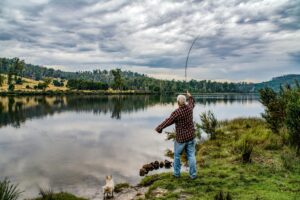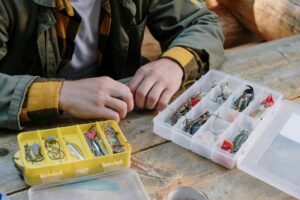Whether you’re a seasoned angler or a beginner looking to cast your line, understanding what fishing license you need is crucial before heading out to the water. With a variety of licenses to choose from depending on your age, residency, and fishing location, it can be confusing to navigate through all the requirements. In this article, we’ll break down the different types of fishing licenses available and help you determine which one is right for you. So before you reel in your first catch of the day, let’s make sure you have the proper fishing license to ensure a memorable and enjoyable fishing experience.

Types of Fishing Licenses
Freshwater Fishing License
A freshwater fishing license allows you to fish in lakes, ponds, rivers, and streams that are not connected to the ocean. This license is specifically geared towards individuals who enjoy the tranquility and natural beauty of freshwater bodies. Whether you are targeting bass, trout, perch, or any other freshwater species, this license is a must-have.
Saltwater Fishing License
On the other hand, if you prefer the thrill of the open ocean and the challenge of catching saltwater species like marlin, tuna, or redfish, a saltwater fishing license is essential. This license gives you permission to fish in coastal waters, estuaries, and other saltwater areas. Whether you are an experienced angler or just starting out, the excitement of reeling in a big saltwater trophy is hard to resist.
Combination Fishing License
For those who wish to explore both freshwater and saltwater fishing, a combination fishing license is the perfect choice. With this license, you can enjoy the best of both worlds, without the need for separate licenses. Whether you want to spend a quiet day by a peaceful river or venture out to the deep sea, a combination fishing license offers the versatility you need.
Age Restrictions
Age Requirements for Fishing License
Before acquiring a fishing license, it’s important to understand the age requirements set by your state. In most cases, individuals of a certain age and older are required to obtain a fishing license. Common age limits range from 16 to 18 years old, but it’s crucial to check the specific regulations in your state. Becoming familiar with the age requirements ensures that you comply with the law and enjoy your fishing adventures legally.
Age Exceptions for Fishing License
While age requirements are generally in place, some states offer exceptions for young anglers. These exemptions allow children under a certain age to fish without a license, as long as they are accompanied by a licensed adult. These exceptions provide a wonderful opportunity for families to bond over a shared love of fishing and introduce younger generations to the joys of the sport.
Duration of Fishing Licenses
Annual Fishing License
An annual fishing license provides the freedom to fish throughout the year. It is a popular choice for avid anglers who enjoy multiple fishing trips and want the flexibility to explore different fishing spots at their leisure. By opting for an annual license, you can immerse yourself in the world of fishing and embark on countless adventures without worrying about the validity of your license.
Short-Term Fishing License
For those who are unsure about their long-term fishing plans or simply want to try out the sport, a short-term fishing license is the ideal solution. These licenses typically grant fishing privileges for a specified period, such as a week or a month. Short-term licenses are great for vacationers, occasional anglers, or individuals who prefer to fish on a more sporadic basis.
One-Day Fishing License
If you’re eager to experience a day of fishing but don’t need a longer-term license, a one-day fishing license is the perfect choice. This option allows you to enjoy the thrill of fishing for a single day without committing to a longer duration. Whether you’re on a business trip, passing through a fishing hotspot during a road trip, or simply have a day free to indulge in your favorite hobby, a one-day license is quick and convenient.
State-Specific Regulations
Different Fishing Licenses for Each State
It’s important to note that fishing license requirements can vary significantly from state to state. Each state has its own set of regulations that dictate the specific licenses, permits, and endorsements needed to fish legally within its jurisdiction. Therefore, it’s crucial to familiarize yourself with the rules and regulations of the state in which you plan to fish. This way, you can ensure that you have the appropriate licenses and avoid any potential legal trouble.
Residency Requirements
Many states differentiate between residents and non-residents when issuing fishing licenses. Resident licenses are generally cheaper and may have additional benefits for individuals who are permanent residents of the state. Non-resident licenses are typically more expensive and are targeted towards visitors or temporary residents. Residency requirements vary between states, so make sure to check the specific regulations to determine whether you qualify for resident rates.
Non-Resident Fishing Licenses
If you plan on fishing in a state where you are not a resident, you will need to obtain a non-resident fishing license. Whether you’re traveling for leisure, on a business trip, or exploring a new fishing hotspot, it’s essential to secure the correct license to fish legally. Non-resident licenses may have different prices, durations, or requirements compared to resident licenses, so be sure to research and obtain the appropriate non-resident license before casting your line.

Special Permits and Endorsements
Special Permits for Catching Certain Species
In addition to a basic fishing license, some states require special permits to target specific species. These permits are usually intended for conservation purposes, as they help regulate the harvesting of vulnerable or protected fish populations. Examples of species that may require a special permit include sturgeon, certain types of trout, or endangered fish species. If you plan on targeting these special species, make sure to obtain the necessary permits to stay in compliance with the local regulations.
Additional Endorsements for Certain Fishing Methods
Some fishing methods, such as fly fishing or spearfishing, may require additional endorsements on your fishing license. These endorsements demonstrate that you have received the necessary training or possess the skills required to participate in these specialized techniques. Endorsements often involve an extra fee or a separate certification process. So, if you have a particular interest in a specific fishing method, such as using a fly rod or spearfishing, consider getting the corresponding endorsement to fully enjoy your chosen fishing style.
Fishing License Exemptions
Age-Based Exemptions
As mentioned earlier, some states offer exemptions for specific age groups, allowing children or senior citizens to fish without a license. These exemptions aim to encourage family bonding, introduce younger generations to fishing, or provide recreational opportunities for senior citizens. While fishing license exemptions typically have age restrictions and accompanying regulations, they offer a chance for certain individuals to enjoy the sport and create lasting memories without the need for a license.
Disability Exemptions
Many states provide fishing license exemptions for individuals with disabilities, recognizing that fishing can be an inclusive and therapeutic activity for people of all abilities. These exemptions often require appropriate documentation, such as a disability permit or a doctor’s certification. By offering exemptions, states aim to ensure that everyone has the opportunity to experience the joy of fishing, regardless of their physical or mental abilities.
Veteran Exemptions
To honor and support the men and women who have served in the armed forces, some states offer fishing license exemptions for veterans. These exemptions allow veterans to enjoy fishing without the need to purchase a license, as a gesture of gratitude for their service. Veterans interested in taking advantage of this exemption should research the specific requirements and documentation needed to qualify for the exemption in their state.
Free Fishing Days
Certain states designate specific days or weekends as “Free Fishing Days,” during which fishing licenses are not required for anyone. These events are typically held to encourage people who do not regularly fish to experience the sport at no cost. It’s important to note that while a license may not be required on Free Fishing Days, all other fishing regulations, such as bag limits and size restrictions, still apply. Free Fishing Days provide an excellent opportunity for individuals to dip their toes into the world of fishing and see if it’s a hobby that they may want to pursue further.

Online Purchase and Renewal
Online Platforms for License Purchase
In today’s digital age, purchasing a fishing license has become more convenient than ever. Many states offer online platforms where you can easily purchase a fishing license without leaving the comfort of your home. These online systems are user-friendly and typically provide options to choose the desired license type, duration, and any necessary endorsements. Online license purchase platforms also often allow you to print a temporary license immediately or provide a digital copy that can be saved on your smartphone or tablet.
Renewal Options
When your fishing license is approaching its expiration date, you have several options for renewal. Many states offer online renewal options, allowing you to extend the validity of your license with just a few clicks. Some states also provide automatic license renewal services, where you can set up recurring payments, ensuring that you’re always covered and never fishing with an expired license. If online renewal is not available, you can usually renew your fishing license through authorized vendors, such as sporting goods stores or local government offices.
Cost of Fishing Licenses
Price Variation Depending on License Type
The cost of fishing licenses varies depending on the type of license you choose. Freshwater fishing licenses are generally less expensive than saltwater licenses due to the different regulations, conservation efforts, and monitoring required for each environment. Combination licenses, which cover both freshwater and saltwater fishing, often offer some cost savings compared to purchasing separate licenses for each type of water. The price variation ensures that anglers can select a license that aligns with their preferred fishing destinations and budgets.
Resident vs Non-Resident Fees
Another factor that affects the cost of fishing licenses is the distinction between resident and non-resident fees. Resident license fees are usually more affordable and offer discounts to individuals who are permanent residents of the state. Non-resident fees are typically higher, as they are geared towards individuals who plan to fish in a state where they are not permanent residents. The pricing structure reflects the investment made by resident taxpayers to support fishery conservation efforts and ensures visitors contribute their fair share.
Additional Fees for Special Permits and Endorsements
In addition to the basic fishing license fees, states may charge additional fees for special permits and endorsements. These fees compensate for the extra administrative work, monitoring, and enforcement required for managing specialized fishing activities. The fees for special permits and endorsements are often reasonable and designed to cover the costs associated with ensuring the sustainability and preservation of targeted fish species and fishing methods in the state.
License Requirements for Different Fishing Methods
Fly Fishing License
Fly fishing is a specialized fishing technique that often requires an endorsement on your fishing license. This endorsement ensures that you have the necessary knowledge and skills to practice fly fishing responsibly. Some states may also require a separate fly fishing license. Fly fishing licenses and endorsements may have specific regulations, such as restricting certain areas or seasons for fly fishing, so it’s essential to check your state’s requirements before enjoying this unique angling experience.
Ice Fishing License
Ice fishing is a popular winter pastime, and many states require a separate license or endorsement specifically for this fishing method. Since ice fishing involves unique risks and considerations, it’s crucial to familiarize yourself with the regulations governing ice fishing in your state. These regulations often address safety measures, ice thickness guidelines, and gear requirements to ensure your safety and the preservation of the fishery during the colder months.
Spearfishing License
Spearfishing, which involves hunting fish underwater using a spear or similar device, is a specialized fishing method that requires a separate license or endorsement in some states. This endorsement allows regulators to manage the harvesting of fish with a method that can be more targeted than traditional fishing. Spearfishing licenses typically have specific regulations regarding species, size restrictions, and equipment use to maintain the balance of the underwater ecosystem and protect vulnerable fish populations.
Commercial Fishing License
Commercial fishing, which involves fishing for profit rather than recreational purposes, requires a distinct type of fishing license. Commercial fishing licenses are specifically designed for individuals or businesses engaged in the buying, selling, or trading of fish. These licenses often involve more rigorous requirements, such as additional permits, vessel inspections, and compliance with commercial fishing quotas. If you’re interested in pursuing fishing as a commercial endeavor, obtaining a commercial fishing license is essential to operate within the legal framework.
Penalties for Fishing without a License
Fine Amounts
Fishing without a valid license is illegal and can result in penalties and fines. The specific fines for fishing without a license vary between states but are generally designed to deter non-compliance with fishing regulations. Failure to obtain and carry a valid fishing license can result in costly fines, ranging from a few hundred dollars to several thousand dollars, depending on the jurisdiction and severity of the offense. It’s crucial to understand the potential consequences and prioritize acquiring the necessary licenses to ensure a pleasant and legal fishing experience.
Legal Consequences
Besides the financial burden of fines, fishing without a license can have more severe legal consequences. Repeat offenses or deliberate violations of fishing regulations may result in legal action, potentially leading to criminal charges or imprisonment. Engaging in illegal fishing activities not only undermines conservation efforts but also tarnishes the reputation of responsible anglers. Remember, fishing regulations are in place to protect fish populations, sustain the ecosystem, and ensure fair access to fishing resources for all, so it’s important to adhere to these regulations to maintain the integrity of the sport.
In conclusion, understanding the various types of fishing licenses, age requirements, duration options, state-specific regulations, exemptions, and penalties is crucial for any angler. Obtaining the appropriate fishing license ensures compliance with local regulations, supports conservation efforts, and allows you to enjoy the sport legally. Whether you’re a beginner or experienced angler, exploring different fishing methods or planning a fishing trip in a new state, knowing the ins and outs of fishing licenses will help you make informed decisions and have an enjoyable and responsible fishing experience. Happy fishing!





